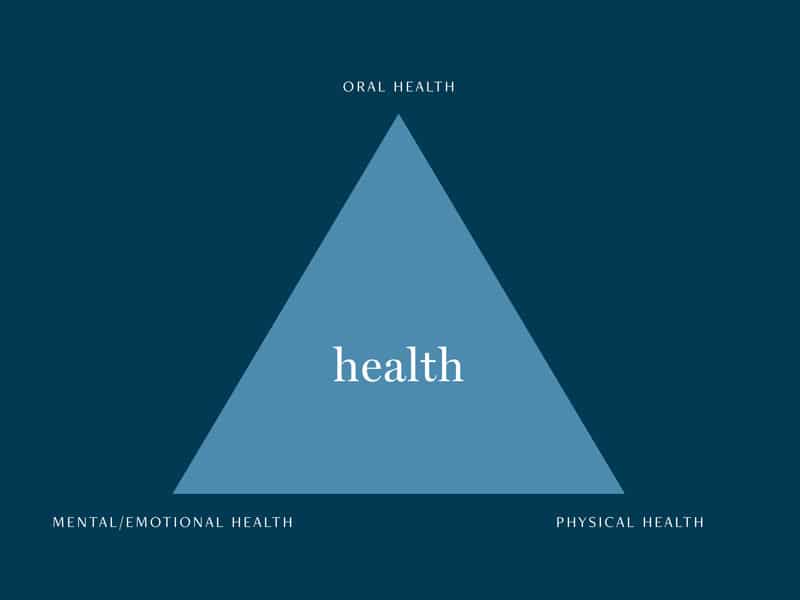Caring for your mouth is caring for your whole well being
Visiting the dentist is not just about your teeth, it’s about your overall health and quality of life. What goes on in your mouth can affect the rest of your body and mental well-being. Conversely, what goes on in your body and mind can also have an effect on your mouth. The relationship between the three is a cyclical one. As mental health and dental health providers, we think it’s important to highlight the connection between these three vital dimensions of our wellness.

There is significant research to support the connection between oral health and physical health. As summarized by Mayo Clinic:
- People who have gum disease are more likely to become diabetic.
- People with diabetes are more likely to be diagnosed with gum disease. Having gum disease can make your blood sugar harder to control (leading to numerous other health problems as well as mood issues).
- People with gum disease may be more likely to have heart attacks or strokes.
- Poor oral health (including pain and missing teeth) can lead to unhealthy diet choices. Poor diet choices can increase your risk for infection and illness.
- Pregnant women with gum disease are more likely to have a preterm birth or low birth weight baby.
- Pregnant women who care for their mouths- by having cavities taken care of and by brushing and flossing regularly are less likely to pass on cavity causing bacteria to their babies.
- Certain bacteria in your mouth can be pulled into your lungs, causing pneumonia and other respiratory diseases.
While research on the connection between oral health and mental health is relatively new and more limited, this study suggests numerous effects that mental health issues have on oral health:
- Depression, anxiety, and other mood disorders are associated with higher use of alcohol, caffeine, and tobacco, or other drugs, which can lead to tooth erosion and decay.
- Anxiety causes an overactivity of the nervous system which is highly correlated to bruxism (clenching and grinding).
- Mental health issues often cause self-neglect and poor nutrition, which may result in poor dental hygiene and consequential tooth decay.
- Some mental health disorders may lead to over-brushing that can damage your gums and enamel.
- In patients with eating disorders, acids from vomiting erodes tooth enamel, making them more susceptible to tooth decay.
- Dry mouth (or xerostomia) is a common side effect of many antidepressants and mood stabilizing drugs. This may lead to greater susceptibility to gum disease, cavities, and bad breath, which may then increase social anxiety.
- Poor oral health can impact speech, eating, smiling, and other social areas of life which may cause significant social anxiety, depression, and isolation.
- People with depression are 20 to 30% more likely to have missing teeth, thereby exacerbating problems with self-esteem and self-image.
- Perception of dental pain may be worsened by depression or anxiety, contributing to avoidance of visiting the dentist.
If you didn’t already have enough reasons to take good care of your mouth, teeth and gums, the relationship between your oral health and your overall health provides even more. Commit to practicing good oral hygiene every day. You’re making an investment in your overall health, not just for now, but for the future too.


